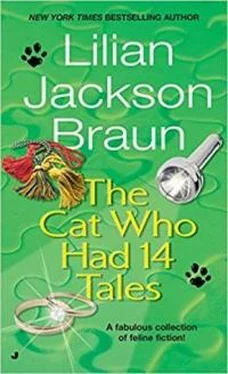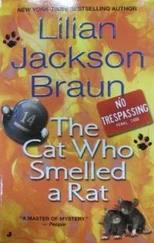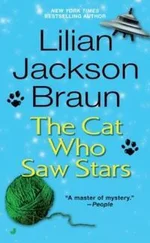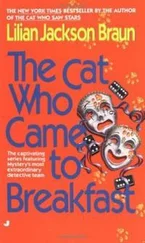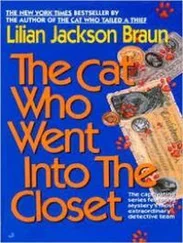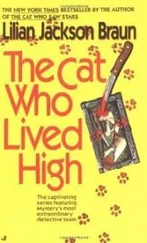I identified myself, at the same time turning on the tape recorder. The cat—if that’s what it was—replied with a deep rumbling growl that ended in an explosive snarl.
“Marmalade! Stop it!” gasped the little woman, breathless from some recent exertion. “Please come in,” she said to me. “This is Marmalade, our resident mouser. He is usually quite friendly, but he has had a traumatic experience of some mysterious kind. I hope you will forgive him.”
As I stepped into the large formal entrance hall the orange cat arched his back and fluffed his tail, swelling to twice his size, then bared his long yellow fangs and flattened his ears to attack position.
“Has this cat been watching horror films?” I asked.
“Go away, Marmalade. You are not needed.” The woman nudged him with the stick, which he grabbed in his teeth. “Nice kitty, nice kitty,” she said as she wrestled with him for possession of the shillelagh. I noticed that her left hand was wrapped in a bloodstained handkerchief.
“What happened to you?” I asked in surprise.
“I do hope you didn’t wait long,” she said, still breathing heavily. “I didn’t hear the bell. My hearing aid seems to be out of order. I think the battery is weak. But Marmalade let me know you had arrived. You must pardon us. We’re a little disorganized this morning. I’m substituting for Mrs. Sheffield. The ambulance took her away just half an hour ago. I hurried over as fast as I could to let you in.”
From the entrance hall I could see the drawing room—huge and lavishly furnished, but with tables and chairs knocked over and broken china on the floor.
“What happened here?” I asked in a louder voice.
“I’m Rhoda Finney. Mrs. Sheffield is the real authority on the collection, but I shall do my best. Let me get rid of this handkerchief. The bleeding seems to have stopped. It’s nothing serious.” She turned to the cat, who had assumed a bulldog stance and was eyeing both of us with suspicion. “We had a little misunderstanding, didn’t we, kitty?”
He started licking his claws. I looked at him with speculation, and he took time out to hiss in a nasty way before resuming his chore.
“I’m afraid the drawing room is a sorry mess,” Ms. Finney went on, “but we have been told not to touch anything. Mrs. Sheffield discovered it an hour ago and had a heart attack. Fortunately Mr. Tibbitt arrived and found her. He’s our volunteer custodian. A dear sweet man. Ninety years old.”
“Is this the work of vandals?” I shouted. Marmalade gave me a mean look, and Ms. Finney continued as if I had not said a word.
“To appreciate this house you must understand the five generations of Lockmasters. Frederick was the founder of the family fortune. Being a lumber baron he used only the finest hardwoods in the house, and the construction was done by ship’s carpenters. Notice the superb woodwork in the grand staircase.” Her manner became coy. “Frederick was a handsome bearded man and had mistresses by the dozen! We’re not supposed to mention personal details, but I think it adds to the interest, don’t you? And I know you won’t print it . . . . Now let us step into the drawing room. Be careful of the broken porcelain.”
The walls were hung with oil paintings and tapestries, while the far end of the room was dominated by an elaborate organ on a dais, above which were four portraits. Besides the bearded Frederick there were a Civil War officer, a dapper Edwardian chap, and a contemporary businessman in banker’s gray, double-breasted.
“The four generations,” my guide explained. “Frederick’s son was named Charles. We call him Charles the Connoisseur. After the war, in which he fought heroically, he acquired the old masters you see in this room, and the Gobelin tapestries, and the signed French furniture. Also the rare reed organ. They’re all identified in our catalog, which sells for three dollars, but I’ll give you a copy . . . . Oh, dear! There’s blood all over this valuable Aubusson. Do you think the rug cleaners will be able to get it out? Marmalade has been licking his claws all morning. I think it was the taste of human blood that drove him out of his head.”
My efforts to interject a question or a comment went ignored as Ms. Finney led the way into the next room.
“Now we come to the third generation,” she said. “Theo was a world traveler and big-game hunter. Also a bit of a playboy like his grandfather, but don’t print that. Shot himself in India— not accidentally, they say. This is the gentlemen’s smoking room.”
On the tooled leather walls were mounted animal heads of every exotic species, as well as primitive hunting spears. The orange cat was still following us and was now smelling my shoes and making a disagreeable face.
“Kitty, stop that!” my guide scolded. “It’s not proper! Go and watch a mousehole . . . . To continue: the fourth generation established the fine library across the hall—thousands of rare books and first editions. Philip the Philanthropist, we named him. He and his charming wife, Margaret, deeded this house to the Historical Society when they disinherited their son. A tragic situation! He was their only child. Dennis the Disappointment, our custodian calls him. Dennis is in prison now, and we all feel more comfortable knowing he’s behind bars. Please don’t print that, however.”
I had given up trying to ask questions and was following the guide dumbly.
She was breathing normally now, and she went on with apparent relish: “Dennis was a student of mine when I was teaching elementary, and I knew he would never amount to anything. His father believed children should attend public school like anyone else, but things got so bad that they had to take him out. Later he was expelled from three colleges—not even good ones. He got into despicable kinds of trouble. Finally he was arrested in a . . . drug bust, I believe it’s called . . . . Marmalade! Leave the visitor alone!”
The cat was getting chummy now, rubbing against my ankles and taking friendly nips at my nylons.
“Dennis broke his mother’s heart,” Ms. Finney said. “Upstairs you’ll see her personal suite, all done in tones of peach. I’ll not go with you because my knees rebel at those twenty-two stairs, but you’ll find it well worth the climb. Be sure to see the glass cases with Margaret’s collection of Fabergé eggs. She also had priceless jewels that had been in the family for four generations. After they were stolen she went into a decline and died shortly after. Be sure to see her bathroom, all done in black onyx. Philip died quite recently in a plane crash in Europe. All very sad.”
We had reached the paneled dining room that could seat twenty-four, and my guide was extolling the boiserie, when Marmalade suddenly appeared with a dead mouse, which he dropped on my shoe. I shook it off ever so gently to avoid hurting his feelings or throwing him into a rage. He was a very peculiar animal.
“How very sweet!” Ms. Finney exclaimed. “He has brought you a present—to apologize for his rude behavior. Nice kitty!”
At this point there were sounds of activity in the rear of the house, and eventually a lanky old man approached us. He seemed vigorous for his age, but his arms and legs moved in a disjointed way, like a robot’s. Although it was summer he wore a dark business suit, rusty with age and dusty around the knees. Without preliminaries he announced in a high-pitched, reedy voice: “The fingerprint people are coming this afternoon, so we can’t open the museum—maybe not for several days. It depends how the investigation goes.”
Ms. Finney said: “This is Mr. Tibbitt, our beloved custodian. He was my principal when I was teaching elementary . . . . Now that you’re here, Mr. T, I’d like to run over to the hospital to see how Mrs. Sheffield is doing.”
Читать дальше
